-
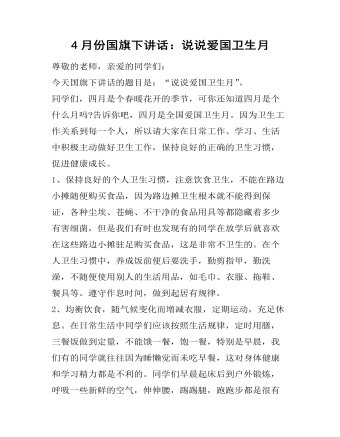
4月份国旗下讲话:说说爱国卫生月
尊敬的老师,亲爱的同学们:今天国旗下讲话的题目是:“说说爱国卫生月”。同学们,四月是个春暖花开的季节,可你还知道四月是个什么月吗?告诉你吧,四月是全国爱国卫生月。因为卫生工作关系到每一个人,所以请大家在日常工作、学习、生活中积极主动做好卫生工作,保持良好的正确的卫生习惯,促进健康成长。1、保持良好的个人卫生习惯,注意饮食卫生,不能在路边小摊随便购买食品,因为路边摊卫生根本就不能得到保证,各种尘埃、苍蝇、不干净的食品用具等都隐藏着多少有害细菌,但是我们有时也发现有的同学在放学后就喜欢在这些路边小摊驻足购买食品,这是非常不卫生的。在个人卫生习惯中,养成饭前便后要洗手,勤剪指甲,勤洗澡,不随便使用别人的生活用品,如毛巾、衣服、拖鞋、餐具等。遵守作息时间,做到起居有规律。2、均衡饮食,随气候变化而增减衣服,定期运动,充足休息。在日常生活中同学们应该按照生活规律,定时用膳,三餐饭做到定量,不能饿一餐,饱一餐,特别是早晨,我们有的同学就往往因为睡懒觉而未吃早餐,这对身体健康和学习精力都是不利的。同学们早晨起床后到户外锻炼,呼吸一些新鲜的空气,伸伸腰,踢踢腿,跑跑步都是很有好处的。
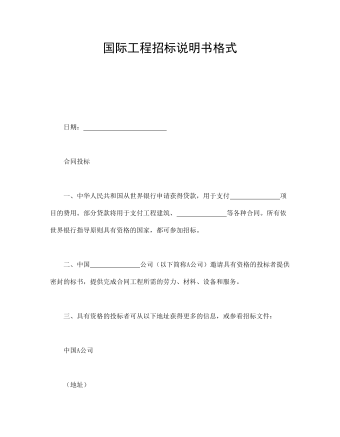
国际工程招标说明书格式
一、中华人民共和国从世界银行申请获得贷款,用于支付 项目的费用。部分贷款将用于支付工程建筑、 等各种合同。所有依世界银行指导原则具有资格的国家,都可参加招标。二、中国 公司(以下简称A公司)邀请具有资格的投标者提供密封的标书,提供完成合同工程所需的劳力、材料、设备和服务。三、具有资格的投标者可从以下地址获得更多的信息,或参看招标文件:中国A公司(地址)四、第一位具有资格的投标者在交纳 美元(或人民币),并提交书面申请后,均可从上述地址获得招标文件。五、每一份标书都要附一份投标保证书,且应不迟于 (时间)提交给A公司。六、所有标书将在 (时间)当着投标者代表的面开标。七、如果具有资格的国外投标者希望与一位中国国内的承包人组建合资公司,需在投标截止日期前30天提出要求。业主有权决定是否同意选定的国内承包人。八、标前会议将在 (时间) (地址)召开。投标者须知一、工程概述(根据具体情况写)二、资金来源
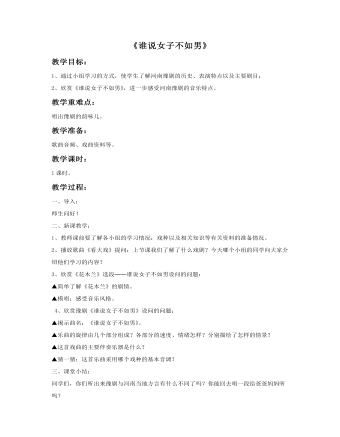
《谁说女子不如男》教案
教学过程: 一、导入:师生问好!二、新课教学:1、教师课前要了解各小组的学习情况:戏种以及相关知识等有关资料的准备情况。2、播放歌曲《看大戏》提问:上节课我们了解了什么戏剧?今天哪个小组的同学向大家介绍他们学习的内容? 3、欣赏《花木兰》选段──谁说女子不如男设问的问题:▲简单了解《花木兰》的剧情。▲模唱:感受音乐风格。 4、欣赏豫剧《谁说女子不如男》设问的问题:▲揭示曲名:《谁说女子不如男》。▲乐曲的旋律由几个部分组成?各部分的速度、情绪怎样?分别描绘了怎样的情景?▲这首戏曲的主要伴奏乐器是什么?▲猜一猜:这首乐曲采用哪个戏种的基本音调?
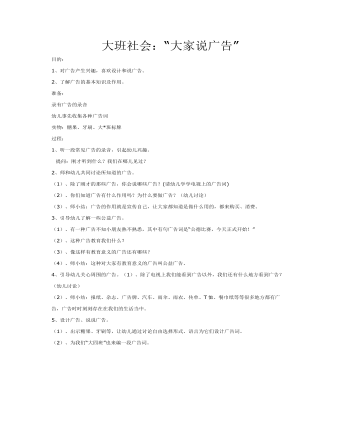
大班社会教案:大家说广告
2、了解广告的基本知识及作用。准备:录有广告的录音幼儿事先收集各种广告词实物:糖果、牙刷、大*班标牌过程:1、听一段常见广告的录音,引起幼儿兴趣。 提问:刚才听到什么?我们在哪儿见过?2、师和幼儿共同讨论所知道的广告。(1)、除了刚才的那些广告,你会说哪些广告?(请幼儿学学电视上的广告词)(2)、你们知道广告有什么作用吗?为什么要做广告?(幼儿讨论)(3)、师小结:广告的作用就是宣传自己,让大家都知道是做什么用的,都来购买、消费。
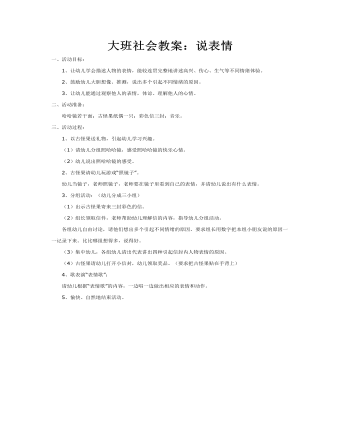
大班社会教案:说表情
二、活动准备: 哈哈镜若干面;古怪果纸偶一只;彩色信三封;音乐。三、活动过程:1、以古怪果送礼物,引起幼儿学习兴趣。 (1)请幼儿分组照哈哈镜,感受照哈哈镜的快乐心情。 (2)幼儿说出照哈哈镜的感受。2、古怪果请幼儿玩游戏“照镜子”。 幼儿当镜子,老师照镜子,老师要在镜子里看到自己的表情,并请幼儿说出有什么表情。3、分组活动:(幼儿分成三小组) (1)出示古怪果寄来三封彩色的信。
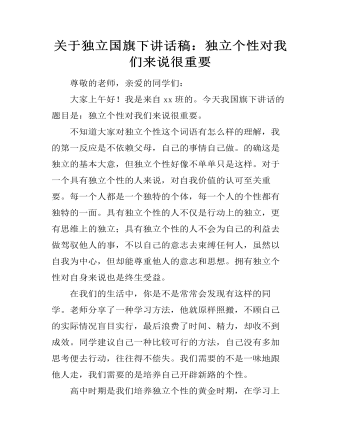
关于独立国旗下讲话稿:独立个性对我们来说很重要
尊敬的老师,亲爱的同学们:大家上午好!我是来自xx班的。今天我国旗下讲话的题目是:独立个性对我们来说很重要。不知道大家对独立个性这个词语有怎么样的理解,我的第一反应是不依赖父母,自己的事情自己做。的确这是独立的基本大意,但独立个性好像不单单只是这样。对于一个具有独立个性的人来说,对自我价值的认可至关重要。每一个人都是一个独特的个体,每一个人的个性都有独特的一面。具有独立个性的人不仅是行动上的独立,更有思维上的独立;具有独立个性的人不会为自己的利益去做驾驭他人的事,不以自己的意志去束缚任何人,虽然以自我为中心,但却能尊重他人的意志和思想。拥有独立个性对自身来说也是终生受益。在我们的生活中,你是不是常常会发现有这样的同学。老师分享了一种学习方法,他就原样照搬,不顾自己的实际情况盲目实行,最后浪费了时间、精力,却收不到成效。
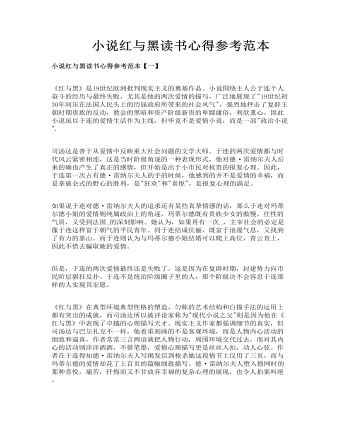
小说红与黑读书心得参考范本
司汤达是善于从爱情中反映重大社会问题的文学大师。于连的两次爱情都与时代风云紧密相连,这是当时阶级角逐的一种表现形式,他对德·雷纳尔夫人后来的确也产生了真正的感情,但开始是出于小市民对权贵的报复心理。因此,于连第一次占有德·雷纳尔夫人的手的时候,他感到的并不是爱情的幸福,而是拿破仑式的野心的胜利,是"狂欢"和"喜悦",是报复心理的满足。 如果说于连对德·雷纳尔夫人的追求还有某些真挚情感的话,那么于连对玛蒂尔德小姐的爱情则纯属政治上的角逐,玛蒂尔德既有贵族少女的傲慢,任性的气质,又受到法国_的深刻影响。她认为,如果再有一次_,主宰社会的必定是像于连这样富于朝气的平民青年。同于连结成伉俪,既富于浪漫气息,又找到了有力的靠山。而于连则认为与玛蒂尔德小姐结婚可以爬上高位,青云直上,因此不惜去骗取她的爱情。
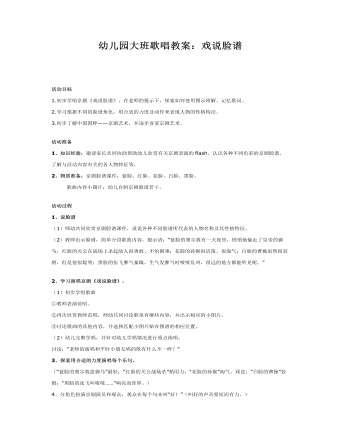
幼儿园大班歌唱教案:戏说脸谱
2.学习根据不同的脸谱角色,用合适的力度及动作来表现人物的性格特征。 3.初步了解中国国粹——京剧艺术,并逐步喜爱京剧艺术。活动准备 1、知识经验:邀请家长共同协助帮助幼儿欣赏有关京剧表演的flash、认识各种不同色彩的京剧脸谱、了解与活动内容有关的各人物特征等, 2、物质准备:京剧脸谱课件:蓝脸、红脸、花脸、白脸、黑脸。 歌曲内容小图片;幼儿自制京剧脸谱若干。 活动过程 1、说脸谱 (1)师幼共同欣赏京剧脸谱课件,说说各种不同脸谱所代表的人物名称及其性格特征。
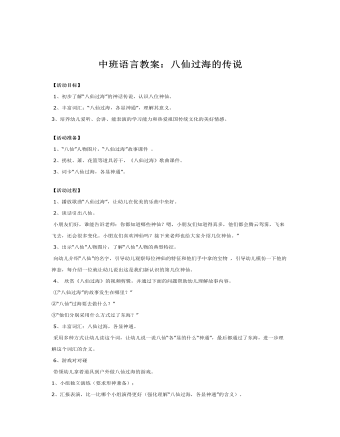
中班语言教案:八仙过海的传说
3、培养幼儿爱听、会讲、能表演的学习能力和热爱祖国传统文化的美好情感。【活动准备】 1、“八仙”人物图片,“八仙过海”故事课件。 2、拐杖、萧、花篮等道具若干,《八仙过海》歌曲课件。 3、词卡“八仙过海,各显神通”。【活动过程】 1、播放歌曲“八仙过海”,让幼儿在优美的乐曲中坐好。 2、谈话引出八仙。 小朋友们好,谁能告诉老师:你都知道哪些神仙?嗯,小朋友们知道得真多,他们都会腾云驾雾,飞来飞去,还会很多变化。小朋友们喜欢神仙吗?接下来老师也给大家介绍几位神仙。” 3、出示“八仙”人物图片,了解“八仙”人物的典型特征。 向幼儿介绍“八仙”的名字,引导幼儿观察每位神仙的特征和他们手中拿的宝物,引导幼儿模仿一下他的神态,每介绍一位就让幼儿说出这是我们新认识的第几位神仙。
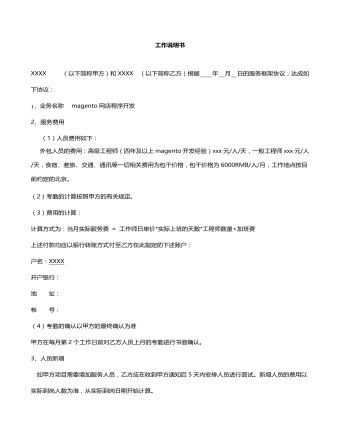
工作说明书
业务名称 magento网店程序开发2、服务费用(1)人员费用如下:外包人员的费用:高级工程师(四年及以上magento开发经验)xxx元/人/天,一般工程师xxx元/人/天,食宿、差旅、交通、通讯等一切相关费用为包干价格,包干价格为6000RMB/人/月,工作地点按目前约定的北京。(2)考勤的计算按照甲方的有关规定。(3)费用的计算:计算方式为:当月实际服务费 = 工作师日单价*实际上班的天数*工程师数量+加班费上述付款均应以银行转账方式付至乙方在此指定的下述账户:户名:XXXX开户银行:地 址:帐 号:(4)考勤的确认以甲方的最终确认为准甲方在每月第2个工作日前对乙方人员上月的考勤进行书面确认。3、人员新增

人教版新目标初中英语八年级上册Could you please clean your room教案3篇
一、 教学内容Section A 1a----1c二、 教学目标1.学习词汇do the dishes, make the bed, take out the trash, fold the clothes, do the laundry, sweep the floor, clean the living room.2.句型 Could you please clean your room? Yes, sure.三、 教学准备 学生预习本单元所有的词汇多媒体课件 活动表 奖品四、 教学过程Pre-task1. Warming upEnjoy ourselves. Watch cartoon Cinderella. 看动画片段《灰姑娘》导如入本课话题和新词汇“chores”美丽善良的鬼姑娘因继母的嫉妒,每天得做所有的家务。片段的主题使学生联想到本课的话题。2. learn new words and phrasesLook! What is she / he dong? 看图学习动词词组do chores, do the dishes, make the bed, take out the trash, fold the clothes, do the laundry, clean the living room.3. Guessing game.What is she doing ? 4. Pair work. 1a, Do you do these things at home? Write “Y” for “yes” and “N” for “no”.5. Listening . 1b , Peter’s chores or Mom’s chores?理解目标语Could you please clean your room? Yes, sure.Write “M” for Mom’s chores, “P” for Peter’s chores in the chart.6. PairworkLook at the picture,Ask your partner to do the chores that you see. 7. Interview Who is the most able at home? 1) What chores do you do at home? How often do you do the chores? Work in four, interview each of the students in the group, fill in the chart.

人教版新目标初中英语八年级上册Can you come to my party教案3篇
Step 3 (3b)First, tell the students when we talk about our future plans, we often use: I’m+verb+ing When we talk about what we must do, we use have to. Ask the students to fill in the blanks in 3b. The answers are: shopping, go to see, a test, I’m going, my family. Step 4 (3c)Let the students write an e-mail message to a friend. Say why you can’t visit next. Before the exercise, ask the students to give some possible answers and write them on the blackboard. So the students will feel easy to finish the writing exercise. After they finish it, Let them to correct it in groups first. Each group chooses theirs best one to read in front of the whole class. Step 5 ( planning a party )First read the conversation in the box together. Then ask the students to turn to page 88.Write down everything you have to do next week. Write in all the things you have to do . Ask the students to look at the list. Ask them “What day are you free?” This is when you can have your party. Step 6 (Self check 1 )Let the students to fill in the blanks with the words given. Change the forms of the words if possible. Then make their own sentences. The answers are: visit, playing, have to, study, comeStep 7 (Self check 2)Imagine you are Marie. Read the information and look at your schedule. Write replies to the invitation.
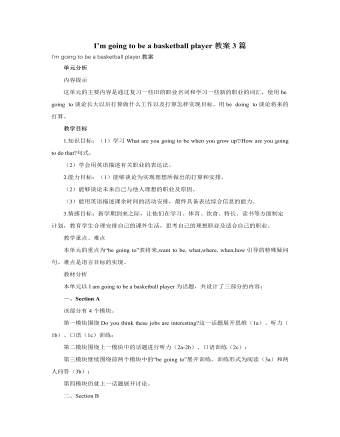
人教版新目标初中英语八年级上册I’m going to be a basketball player教案3篇
教学目标1.知识目标:(1)学习What are you going to be when you grow up?/How are you going to do that?句式。(2)学会用英语描述有关职业的表达法。2.能力目标:(1)能够谈论为实现理想所做出的打算和安排。(2)能够谈论未来自己与他人理想的职业及原因。(3)能用英语描述课余时间的活动安排,最终具备表达综合信息的能力。3.情感目标:新学期到来之际,让他们在学习、体育、饮食、特长、读书等方面制定计划,教育学生合理安排自己的课外生活,思考自己的理想职业及适合自己的职业。教学重点、难点本单元的重点为“be going to”表将来,want to be, what,where, when,how引导的特殊疑问句。难点是语言目标的实现。教材分析本单元以I am going to be a basketball player为话题,共设计了三部分的内容:一、Section A该部分有4个模块。第一模块围绕Do you think these jobs are interesting?这一话题展开思维(1a)、听力(1b)、口语(1c)训练;
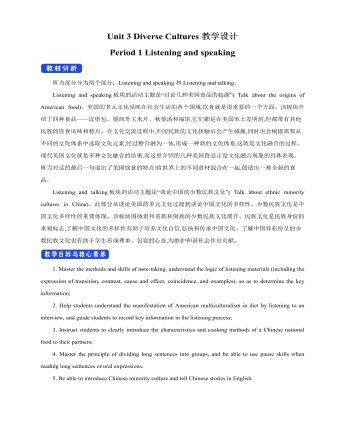
新人教版高中英语必修3Unit 3 Diverse Cultures教学设计一
Activity 81.Grasp the main idea of the listening.Listen to the tape and answer the following questions:Who are the two speakers in the listening? What is their relationship?What is the main idea of the first part of the listening? How about the second part?2.Complete the passage.Ask the students to quickly review the summaries of the two listening materials in activity 2. Then play the recording for the second time.Ask them to complete the passage and fill in the blanks.3.Play the recording again and ask the students to use the structure diagram to comb the information structure in the listening.(While listening, take notes. Capture key information quickly and accurately.)Step 8 Talking Activity 91.Focus on the listening text.Listen to the students and listen to the tape. Let them understand the attitudes of Wu Yue and Justin in the conversation.How does Wu Yue feel about Chinese minority cultures?What does Justin think of the Miao and Dong cultures?How do you know that?2.learn functional items that express concerns.Ask students to focus on the expressions listed in activity. 3.And try to analyze the meaning they convey, including praise (Super!).Agree (Exactly!)"(You're kidding.!)Tell me more about it. Tell me more about it.For example, "Yeah Sure." "Definitely!" "Certainly!" "No kidding!" "No wonder!" and so on.4.Ask the students to have conversations in small groups, acting as Jsim and his friends.Justin shares his travels in Guizhou with friends and his thoughts;Justin's friends should give appropriate feedback, express their interest in relevant information, and ask for information when necessary.In order to enrich the dialogue, teachers can expand and supplement the introduction of Miao, dong, Lusheng and Dong Dage.After the group practice, the teacher can choose several groups of students to show, and let the rest of the students listen carefully, after listening to the best performance of the group, and give at least two reasons.
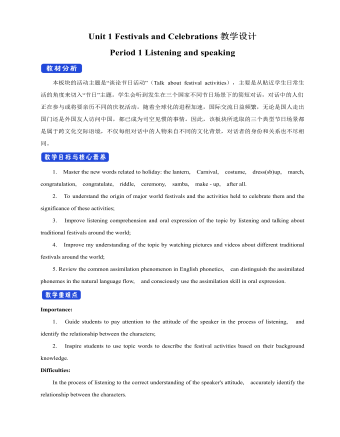
新人教版高中英语必修3Unit 1 Festivals and Celebrations教学设计一
本板块的活动主题是“谈论节日活动”(Talk about festival activities),主要是从贴近学生日常生活的角度来切入“节日”主题。学生会听到发生在三个国家不同节日场景下的简短对话,对话中的人们正在参与或将要亲历不同的庆祝活动。随着全球化的进程加速,国际交流日益频繁,无论是国人走出国门还是外国友人访问中国,都已成为司空见惯的事情。因此,该板块所选取的三个典型节日场景都是属于跨文化交际语境,不仅每组对话中的人物来自不同的文化背景,对话者的身份和关系也不尽相同。1. Master the new words related to holiday: the lantern, Carnival, costume, dress(sb)up, march, congratulation, congratulate, riddle, ceremony, samba, make - up, after all. 2. To understand the origin of major world festivals and the activities held to celebrate them and the significance of these activities;3. Improve listening comprehension and oral expression of the topic by listening and talking about traditional festivals around the world;4. Improve my understanding of the topic by watching pictures and videos about different traditional festivals around the world;5. Review the common assimilation phenomenon in English phonetics, can distinguish the assimilated phonemes in the natural language flow, and consciously use the assimilation skill in oral expression. Importance:1. Guide students to pay attention to the attitude of the speaker in the process of listening, and identify the relationship between the characters;2. Inspire students to use topic words to describe the festival activities based on their background knowledge. Difficulties:In the process of listening to the correct understanding of the speaker's attitude, accurately identify the relationship between the characters.
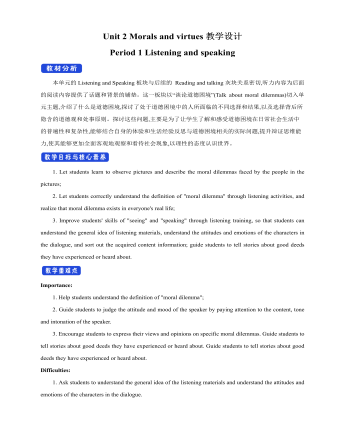
新人教版高中英语必修3Unit 2 Morals and virtues教学设计一
(2) students are divided into groups according to the requirements of activity 3. Each student shares a story of personal experience or hearing-witnessing kindness, and then selects the most touching story in the group and shares it with the whole class. Before the students share the story, the teacher can instruct them to use the words and sentence patterns in the box to express. For example, the words in the box can be classified:Time order: first of all, then, after that, later, finally logical relationship :so, however, although, butTeachers can also appropriately add some transitional language to enrich students' expression:Afterwards, afterwards, at last, in the end, eventuallySpatial order: next to, far from, on the left, in front ofOtherwise, nevertheless, as a result, therefore, furthermore, in addition, as well asSummary: in a word, in short, on the whole, to sum up, in briefStep 8 Homework1. Understand the definition of "moral dilemma" and establish a correct moral view;2. Accumulate vocabulary about attitudes and emotions in listening texts and use them to express your own views;3. Complete relevant exercises in the guide plan.1、通过本节内容学习,学生能否理解理解“道德困境”的定义;2、通过本节内容学习,学生能否通过说话人所表达的内容、说话的语气、语调等来判断其态度和情绪;3、通过本节内容学习,学生能否针对具体的道德困境发表自己的看法和见解,能否掌握听力理训练中的听力策略。

人教版新目标初中英语八年级上册What are you doing for vacation教案2篇
Teaching goals : 1. Words & phrases: babysit ,get back , fishing , rent , think about , decide(on) , tourist etc. 2. How to talk about future plans . 3. 现在进行时表示将来计划或行动. 4. 特殊疑问句(where , when , how long引导) Important and difficult points : Drills :What are you doing for vacation ? I’m watching TV . When are you going ? I’m going … . How long are you staying ? We’re staying for five days . Teaching aids : cards and a tape ,a large wall calendar . Period 1 Teaching procedures : Step 1Leading in1. Free talk . 2. Put up the wall calendar . T: I’m staying home on Saturday (pointing to next Saturday ).Ss repeat . Ss: I’m staying home on Saturday . T: OK. Today we’ll learn how to talk about future plans. Step 2Pre-task SB Page 13 , 1a . 1. Look at the picture carefully and tell what you see in the picture . 2. Write the activities from the pictures in the box and add some more . 3. Practice reading . Step 3While-task1. Using the activities we write in 1a to make conversations .For example :What are you doing for vacation ? I’m visiting my uncle . 2. Pairwork .Practice in pairs . 3. 用第三人称练习对话.
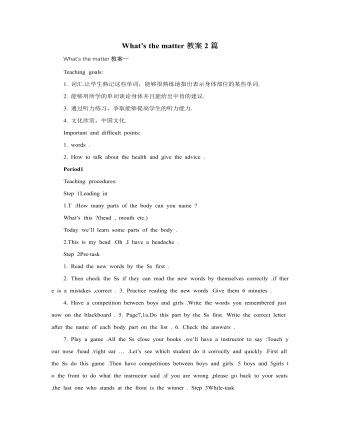
人教版新目标初中英语八年级上册What’s the matter教案2篇
She shouldn’t go to the party tonight.Step7. TaskT: You know, there are lots of problems in our life. If you are a doctor, please tell us how to solve the problem. I will divide you into 9 groups. Please work in groups. And then choose one of you to report your ideas.The following are the problems:I have a toothache.I am hungry. I have a sore throat.I am stressed out. I have a sore back.I am tired. I can’t sleep.I have a cold. I have a headache.Report: If you have a headache, you should go to bed early. You should see the doctor. You should eat some medicine. You shouldn’t wash your face with cold water.You shouldn’t sleep late.You shouldn’t swim.…..T encourages the students to give advice as much as possible.Homework:1. Chose one of the problems, and write down your advice2. Copy the new words这一步是用于热身的,同时也可以让他们复习一部分的表示人体部位的单词,扩充知识.学习语言的过程也是一个不断积累的过程,复习旧知识,增添新知识.通过小游戏,强化学生对Does she/he have…这个句子的运用能力.通过复习,自然的引到下面新知识的学习。充分利用表格,由句子到对话,再到文章,让学生循序渐进. 提高学生的综合语言运用能力,运用以前学过的知识来解决身边的问题.Period 5 (Section B 3a—3c, selfcheck)教学内容与分析:
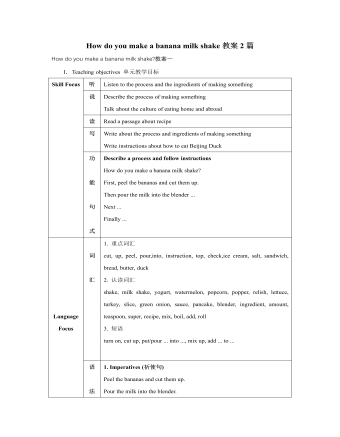
人教版新目标初中英语八年级上册How do you make a banana milk shake教案2篇
1. First, ... then, ... next, ... finally, ...首先,……然后,……接着,……最后,……这是英语中表达做某事的步骤的一种说法。如果步骤较多,还可以说:first-next-after that-later on-finally/at last通常你会听到说英语国家的人在说 first, next, then, finally 和后面的内容时,他们会做一些停顿。这样就能提前告诉听者接下来讲的是一系列的步骤。这一点在朗读和听力中应特别注意。2. how many, how much均为疑问词,同是“多少”,但用法不同。请看:how many修饰可数名词复数,how much修饰不可数名词。但在用法上,同学们常犯如下错误:1) [误] How many are there bananas on the table?[正] How many bananas are there on the table?[析] how many, how much 中的many,much是形容词,常修饰名词作定语,故后面跟名词。2) [误]How much tea are there on the table?[正]How much tea is there on the table?[析] how much修饰不可数名词时,谓语动词用单数。how many与how much的区别可简记为:前how many:问“多少”,复数名词后面跑;how much问“多少”,不可数名词单数好。前者答语用基数词,后者答语用数量关系。
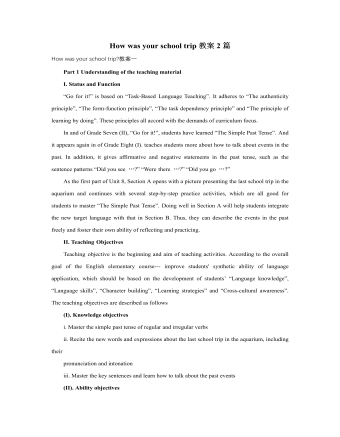
人教版新目标初中英语八年级上册How was your school trip教案2篇
“Go for it!” is based on “Task-Based Language Teaching”. It adheres to “The authenticity principle”, “The form-function principle”, “The task dependency principle” and “The principle of learning by doing”. These principles all accord with the demands of curriculum focus.In and of Grade Seven (II), “Go for it!”, students have learned “The Simple Past Tense”. And it appears again in of Grade Eight (I). teaches students more about how to talk about events in the past. In addition, it gives affirmative and negative statements in the past tense, such as the sentence patterns “Did you see …?” “Were there …?” “Did you go …?” As the first part of Unit 8, Section A opens with a picture presenting the last school trip in the aquarium and continues with several step-by-step practice activities, which are all good for students to master “The Simple Past Tense”. Doing well in Section A will help students integrate the new target language with that in Section B. Thus, they can describe the events in the past freely and foster their own ability of reflecting and practicing. II. Teaching ObjectivesTeaching objective is the beginning and aim of teaching activities. According to the overall goal of the English elementary course--- improve students' synthetic ability of language application, which should be based on the development of students’ “Language knowledge”, “Language skills”, “Character building”, “Learning strategies” and “Cross-cultural awareness”. The teaching objectives are described as follows(I). Knowledge objectivesi. Master the simple past tense of regular and irregular verbsii. Recite the new words and expressions about the last school trip in the aquarium, including their pronunciation and intonation

